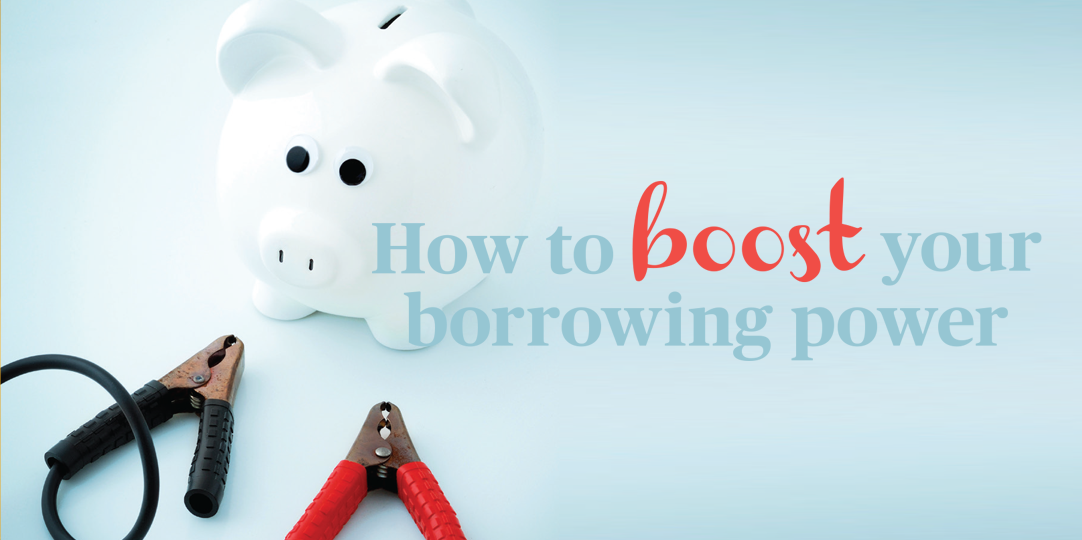If securing your first home, stepping up to something better or securing an investment property is on your to-do list for 2015 then it may be in your interest to maximise your borrowing power. Understanding how much you can borrow will help you make critical decisions, especially when it comes to what to buy and when.

How to boost your borrowing power
There are a number of factors that influence your borrowing capacity. The key ones are income and existing debt including credit cards and personal loans.
If borrowing for a property purchase, a lender will also look at the value of the property in question and the value of any existing property you hold, which is counted as equity.
First-home buyers, who won’t have the benefit of equity in existing property, are usually only able to borrow up to 80 per cent of a property’s value – as estimated by the lender, not the real estate agent. That’s because the lender requires a resale buffer as protection in the event you default on the loan and the property needs to be sold to make good on the debt. This can be increased up to 95 per cent of the property value, if first-timers take out Lenders Mortgage Insurance (LMI), which can cost several thousand dollars and protects the lender financially if you default. LMI provides no protection to the borrower.
But there are other ways to bump up your borrowing power. Here are Haven’s top tips:
Reduce your credit card limits
It’s not just credit card debt that is considered when lenders work out how much you can borrow. It’s also how much you could rack up. While having a zero balance on a card with a $10,000 limit will be viewed positively, lenders take into account what you could spend more than what you owe. One of the simplest ways to increase your borrowing capacity is to reduce your credit card limits. Cancel cards with zero balance or look at consolidating multiple card debts into one with a lower limit. It still helps to have as little debt as possible, so pay down high-interest credit card debt as quickly as possible.
Reduce taxation
If you have been doing your own tax, there’s a chance you have been missing some deductions. Get an accountant to manage your return to ensure you are taking advantage of your maximum entitlements. By reducing your tax you increase your after-tax income, which can be factored into your loan application.
Increase your savings
Going by the 80 per cent property value rule, the bigger your deposit, the more you can borrow. One of the simplest ways to save is to sock away any pay increases or windfalls, such as tax returns. You should also prepare a budget and stick to it. Cut your discretionary spending by limiting entertainment, take-aways and visits to shopping centres, where you are more likely to be tempted to make impulse buys.
Keep your records up to date
One of the reasons borrowers fall short of their loan expectations is their inability to prove their income. Make sure you have completed your tax returns and can show recent pay slips. Accurate records are especially essential if you are self-employed so make sure you have tax returns up to date and accurate profit and loss statements to demonstrate cash flow.
Check your credit file
If you have concerns about past debts or overdue payments, check your credit file and take steps to resolve any issues before applying for a loan. Visit: www.oaic.gov.au/privacy/privacy-topics/credit-and-finance/how-do-i-get-a-copy-of-my-credit-reportto find out how to get a copy of your credit report.
Make sure you can service extra debt
Remember if you borrow more, you need to repay more. Lenders will use their own formulas to determine if you can make the loan repayments based on the information you provide at the time. If your spending increases or circumstances change, you will still be required to make your loan repayments.
Talk to your broker
Lending criteria and loan products vary between financial institutions. A mortgage broker has access to a variety of lenders and their loan products and can help source the right loan for your circumstances.
Tax information: the information in this article does not constitute advice. As taxation legislation is complex, we recommend you speak with your financial advisor, tax advisor or contact the ATO for further details and expert advice regarding your personal circumstances.details and expert advice in relation to your personal circumstances.
Any advice contained in this article is of a general nature only and does not take into account the objectives, financial situation or needs of any particular person. Therefore, before making any decision, you should consider the appropriateness of the advice with regard to those matters. Information in this article is correct as of the date of publication and is subject to change.
